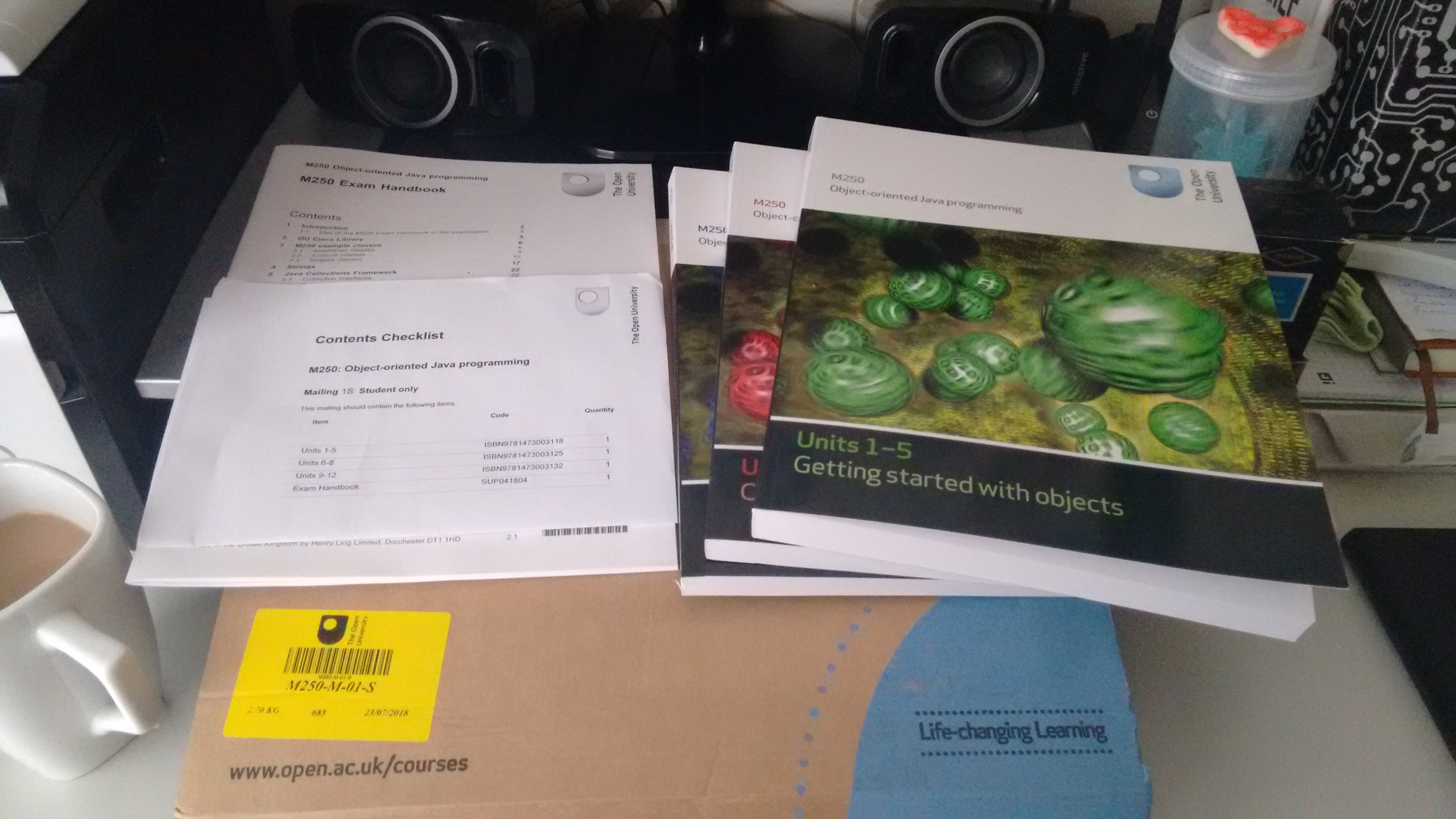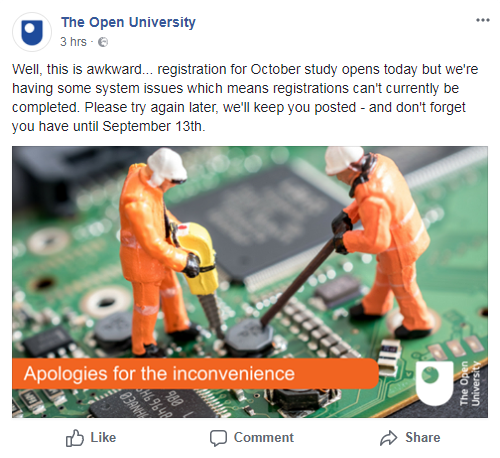Wooooo! It’s over! Yesterday was the big day, and I’m done with it. What follows is sure to be a very long, very rambling description of my first experience with an OU exam.
Things basically began the evening before, when I took my final past exam (September 2014) in exam conditions. By “exam conditions,” of course, I mean I had to let the dog in and out every twenty minutes, deal with the exam room doubling as a kitchen and tea station, and a desk unsurprisingly as large as a kitchen table. But it was close enough to get an idea for how well my revision had gone, and it was great: My fastest time (90 minutes) and best score (100%). I knew it was too good to hope the real thing would go so smoothly, but it bouyed me up with sacks of confidence.
That confidence really took care of my nerves throughout the day. That, or maybe it’s that it’s my busiest week ever at work and I didn’t have time to panic. Either way, I didn’t have any performance anxiety.
I’d been advised several times not to arrive more than about 15 minutes before the start of the exam, but that’s not in my nature. I had to fight with myself not to show up an hour early, but still ended up being about 45 minutes early.
Though the OU description of the venue said that there was “ample parking onsite”, there was not. It was completely full to bursting, but just caught a space as I was leaving to park at the (expensive) mall car park a ten minute walk away. I entered, and was greeted with several lovely signs directing OU exams students to wait in the atrium to be called. The exam was in a hotel, and the atrium was a relaxing place to wait, with a restaurant and a coffee bar, and a water feature filling the room with pleasantly soothing sounds.
It also contained the reason for the lack of parking: Three or four dozen Open University students waiting to take their exam. Apparently being an hour early would have been about average. Still, there were enough comfortable armchairs to go around when I arrived, so I settled down to wait. About half the students I saw had MST124 (or MST125) handbooks with them, some others had different maths books, and there were a few Stage 2 students doing non-maths. (Interestingly, there were no Stage 1 exams for anything other than maths in our centre.)
I’m not sure when we were called into the hall, as I’d left my phone (and therefore clock) in my car. I had only my wallet, keys, MST124 handbook, Casio fx85-PLUS calculator, pen, and three pencils with me. Oh! And a sack of rhubarb and custard sweeties. There was a hastily drawn A2-sized map of the room by the door, showing which rows different modules were sitting in, and where the alphabet breaks were on each row. There were about sixty students in all, with about two dozen there for MST124.
The desks weren’t large. I’d guess about sixty centimetres wide, and less than half a metre deep. They could have been worse. On top of the desk were our desk record (an A5-sized slip of carbon paper with your personal identifier, name, exam number, course name, signature box, and a few boxes to write things), the question booklet, an answer booklet, a folded-over CME (computer-marked exam form), a plastic … clip of some kind, and a flat metal paper clip. This took up basically the whole desk. My stomach actually cramped sitting down at it because of the tight squeeze. I opened my sweeties and placed five of them across the top of the desk (and stowed the rest under my desk) and my three pencils covered the rest of the desk.
One of the invigilators went on for about ten minutes about what not to do, and saying over and over to read all instructions, and follow all instructions. (What he meant was don’t read all of the instructions and follow all of the instructions, instead guess which instructions pertain to you and follow those, instead.) And then we started. For MST124, I should have taken the unnecessary answer booklet and placed it under my desk, and ignored it completely. But I filled it out dutifully, as it had instructions telling me to do so.
I filled out my desk record, and left it with my driver’s license. That always has to remain on the desk, so there’s a large chunk of the desk real-estate you’re never getting back. Next I filled out the admin part of the CME, and placed it on the bottom of all my paperwork. Finally, I opened up my question booklet, and got to work.
This part I’d practised about half a dozen times at home, so there were no difficulties with it. I would work a question, see if it matched any answers, and then see what went wrong if it didn’t. By question 2, I was already stymied. Nothing matched my answer, or looked very much like it, so I re-worked it, and got the same answer. I did it two more times, and noticed myself start to get frustrated. At this point, I mentally put the brakes on, took a deep steadying breath, and convinced myself to skip it and come back to it later.
I completed questions 3 and 4, and noticed while finishing question 4 what I’d probably missed in question 2. Sure enough, I had the right answer, but a simple re-arrangement soon had me circling one of the answers, and moving onto the second page.
After that, the answers mostly tumbled out. The pace felt slower than normal, but I wasn’t struggling. Everything made sense. There were some tricky questions (and trickier answers) but I felt (mostly) confident about all of them. I did run into a degrees/radians mistake at one point, but caught myself in time.
My pencils flew off the desk several times, and I felt I must have been the noisiest one in the room. I didn’t hear anybody else flipping through their handbooks for formulae like I was. But before I knew it, I’d circled the last answer, and I was reaching for the CME form to put my answers down.
I had bought a pack of Staedtler HB pencils last week, and I’m glad I did. Even though I’d been using HB pencils for my practice exams, the Staedtlers marked the paper much better. I’d used one for the question book’s rough work, and one for marking the CME. So having an extra one that was sharpened and ready to go if anything went wrong was nice.
At this point, 90 minutes had passed, matching my best practice exam. I then turned my attention to memorising my answers. All rough work must be done in the question booklet or (unnecessary) answer booklet, and no writing should be done in the handbook, and nothing you write on should be taken out of the room with you. But I found no rules against memorising my answers. It’s not easy to walk away with 42 characters memorised, but I stared at my CME for about fifteen to twenty minutes with various mnemonics, and finally had it down.
I gathered my forms and papers and sheets and booklets together, bolted and clipped them all together, and then raised my hand and waited for an invigilator. She whispered that I’d basically done it all wrong, had me write some numbers in boxes, and did some origami to sort out my paperwork. Hopefully it all gets marked properly.
I gathered my things, swooped out of the room as quietly as I could, sat in the atrium, and wrote down my answers. Our results won’t come back for about six weeks, but we can get the questions in about two days, and I’ll be able to check my answers against Wolframalpha and find out how I did.
And I think that’s it. When the questions are released in a few days, I’ll update with what I think my results are, and I’ll make a different post when my official results are received in July.
2018/06/07 Edit: It looks like I’ve got a 98%! At the very least, assuming my form gets marked, I’ve got a distinction. I didn’t seriously consider that a possibility coming into this module. For my module result to be 98 (from OCAS 99 and OES 98) would have been completely unbelievable to me when I signed up for MST124. It’ll take a few days to get over the shock.)

